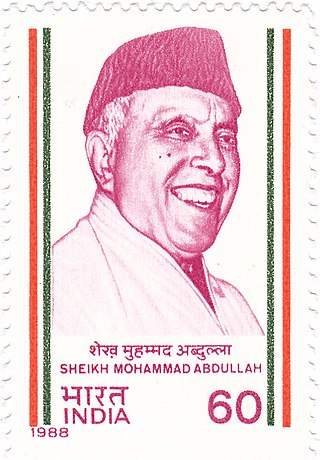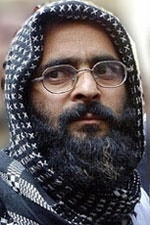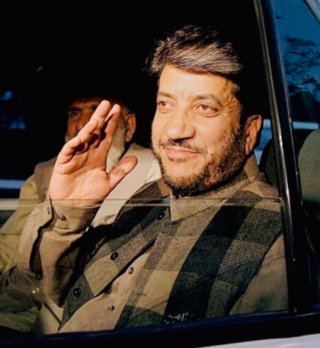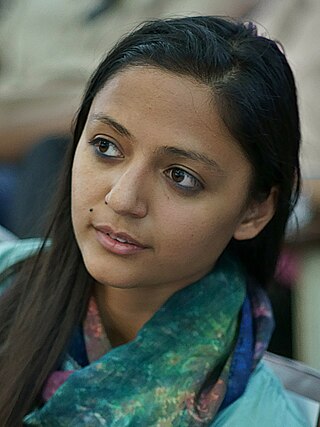
Syed Ali Shah Geelani was an Islamist, pro-Pakistan Kashmiri-separatist leader in the Indian-administered Jammu and Kashmir, regarded as the father of the Kashmiri jihad.

Sheikh Mohammad Abdullah was an Indian politician who played a central role in the politics of Jammu and Kashmir. Abdullah was the founding leader of the All Jammu and Kashmir Muslim Conference and the 1st elected Prime Minister of Jammu and Kashmir after its accession to India. He agitated against the rule of the Maharaja Hari Singh and urged self-rule for Kashmir.He is also known as Sher-e-Kashmir

Mohammad Afzal Guru was a Kashmiri terrorist who was convicted for his role in the 2001 Indian Parliament attack. He received a death sentence for his involvement, which was upheld by the Indian Supreme Court. Following the rejection of a mercy petition by the President of India, he was executed on 9 February 2013. His body was buried within the precincts of Delhi's Tihar Jail.
Abdul Gani Lone was a Kashmiri-separatist political leader.

The Kashmir conflict is a territorial conflict over the Kashmir region, primarily between India and Pakistan, and also between China and India in the northeastern portion of the region. The conflict started after the partition of India in 1947 as both India and Pakistan claimed the entirety of the former princely state of Jammu and Kashmir. It is a dispute over the region that escalated into three wars between India and Pakistan and several other armed skirmishes. India controls approximately 55% of the land area of the region that includes Jammu, the Kashmir Valley, most of Ladakh, the Siachen Glacier, and 70% of its population; Pakistan controls approximately 30% of the land area that includes Azad Kashmir and Gilgit-Baltistan; and China controls the remaining 15% of the land area that includes the Aksai Chin region, the mostly uninhabited Trans-Karakoram Tract, and part of the Demchok sector.

Mirwaiz Mohammad Umar Farooq is the 14th Mirwaiz of Kashmir. He is a Kashmiri separatist political leader. He is also an Islamic religious cleric of Kashmir Valley.
Asiya Andrabi is a Kashmiri separatist and founding leader of Dukhtaran-e-Millat. This group is part of the separatist organisation All Parties Hurriyat Conference in the Kashmir valley. Government of India has declared it as a "banned organization". The organisation claims that it aims for the freedom of Kashmir from India.

Amin Kamil (1924–2014) was a Kashmiri poet, literary critic, researcher and editor. He is also known for his short stories, a genre of which he was one of the pioneers in Kashmiri. He remains one of the most popular and influential masters of the Kashmiri language, leaving behind a legacy of literary brilliance.
Mufti Baha-ud-Din Farooqi was a Kashmiri lawyer, jurist and political figure who served as the 12th Chief Justice of the High Court of Jammu and Kashmir.
Mohammad Abbas Ansari was a separatist political leader and a well known Shia Muslim scholar, reformer, preacher and cleric from Indian-administered Jammu and Kashmir. He was known for his religious lectures and as a Kashmiri separatist, ex-chairman of the All Parties Hurriyat Conference, also founder & chairman of the Ittihadul Muslimeen also known as Jammu & Kashmir Ittihadul Muslimeen (JKIM) a Kashmiri nationalist Shia separatist political party which aims for Shi'a–Sunni unity in Kashmir & independence of Jammu and Kashmir from India through peaceful struggle. He is considered a moderate and has called for an end to violence in that region. He is Succeeded by his son Maulana Masroor Abbas Ansari.

Shabir Ahmad Shah popularly known as Shabir Shah, in Kadipora, Anantnag, Kashmir is the founder and president of the Jammu and Kashmir Democratic Freedom Party (JKDFP), one of the main separatist political organizations seeking "right of self-determination" to Jammu and Kashmir.

The Exodus of Kashmiri Hindus, or Pandits, is their early-1990 migration, or flight, from the Muslim-majority Kashmir valley in Indian-administered Kashmir following rising violence in an insurgency. Of a total Pandit population of 120,000–140,000 some 90,000–100,000 left the valley or felt compelled to leave by the middle of 1990, by which time about 30–80 of them are said to have been killed by militants.
Agha Shaukat Ali was a civil servant turned politician in the princely state of Jammu and Kashmir, British Indian Empire. He served as the General Secretary of the Muslim Conference party in the years preceding the Partition of India. Having migrated to Pakistan after the partition, he served as a civil servant, writer and diplomat.

Nund Rishi, also known as Sheikh Noor-ud-Din Noorani, Sheikh-Ul-Alam and by the title Alamdar-e-Kashmir, was a Kashmiri Sufi saint, mystic, poet and Islamic preacher. Nund Rishi was among the founders of the Rishi order, a Sufi tradition of the region. He influenced many spiritual teachers and saints, including Hamza Makhdoom, Resh Mir Sàeb, and Shamas Faqir.
On 9 February 2016, some students of Jawaharlal Nehru University (JNU) held a protest on their campus against the capital punishment meted out to the 2001 Indian Parliament attack convict Afzal Guru, and Kashmiri separatist Maqbool Bhat. The organisers of the event were former members of the Democratic Students' Union (DSU). The event was held despite the university administrations withdrawing permission for the event shortly before it was due to begin, due to protests by members of the student union of ABVP. The event saw clashes between various student groups. A video was circulated by an Indian news channel, Zee News, in which a small group of individuals, whom a later university-investigation described as outsiders to the university wearing masks, shouted "anti-India" slogans.

Shehla Rashid Shora is an Indian human rights activist who has pursued her Ph.D. at Jawaharlal Nehru University. She was vice-president of the Jawaharlal Nehru University Students' Union (JNUSU) in 2015–16 and was a member of the All India Students Association (AISA). She rose to prominence whilst leading the student agitation calling for the release for Kanhaiya Kumar, Umar Khalid and others who were arrested on charges of sedition in February 2016 for participating and organizing sloganeering in JNU.

A widespread agitation throughout the princely state of Jammu and Kashmir in British Raj occurred in 1931 against the Maharaja's government. The Maharaja was forced to appoint the Glancy Commission to investigate the people's concerns. Various political reforms were adopted including the introduction of the Jammu and Kashmir Praja Sabha. The movement also saw the rise of Sheikh Muhammad Abdullah as the leader of Kashmiris. The movement was funded by some well-to-do Muslim Zaildars and business houses.
The following is a timeline of the Kashmir conflict during the period 1846–1946.
Rughonath Vaishnavi was a Kashmiri Pandit politician who co-founded the Jammu and Kashmir Political Conference along with Ghulam Mohiuddin Karra. A vocal advocate of Kashmir's right to self-determination, he expressed life-long solidarity with Kashmiri Muslims.










